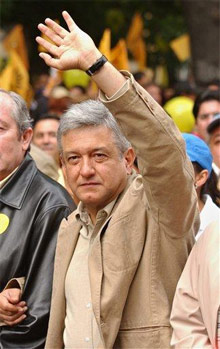 |
 |
 |
 News Around the Republic of Mexico | July 2005 News Around the Republic of Mexico | July 2005  
Some Wary of Mexican Candidate's Populism
 Mark Stevenson - Associated Press Writer Mark Stevenson - Associated Press Writer


| | Lopez Obrador has cultivated an image of austerity, living in a modest apartment in a middle-class district. |
Mexico City, Mexico - The man favored to win the 2006 presidential election resigns this week as Mexico City mayor to formally launch a populist campaign that some fear could be a step back for the country's developing democracy.

Andres Manuel Lopez Obrador's main pledge — to expand nationwide the public works projects and cash payments to the elderly he began in Mexico City — is being criticized as a return to Mexico's old-style, vote-buying politics by some opponents, even as others scramble to imitate the programs.

But the 51-year-old Lopez Obrador, who leaves office Friday, doesn't want any imitators. He doesn't even like being compared to Latin America's rising wave of charismatic leftists, preferring to depict himself as a center-left democrat who is trying to help the poor of Mexico.

The mayor is a skillful politician, but he can seem a bit messianic: intolerant of criticism, leery of openness in his governance, uneasy with sharing power and able to mobilize thousands of supporters to influence public opinion.

"He's not your traditional politician. He feels he has been sent, chosen, invoked, with a prophetic message," said political scientist Oscar Aguilar Ascencio. "He doesn't like to debate that, and feels that mistakes are impossible."

Lopez Obrador reaches the hearts of average Mexicans. He is the clear front-runner in every national poll on the presidential race, although he still must win his party's nomination and faces an increasingly competitive field heading into a yearlong campaign for next July's vote.

"He's a man of the people. He's the first politician in a long time who looks out for us," said Emilio Osorio, a retiree in Mexico City who gets a pension of about $60 a month that Lopez Obrador instituted.

The mayor's common man touch — he rides in an economy car and lives in a modest apartment in a middle-class district — may come from the years he spent working as a government development official with the Chontal Indians in his native Gulf coast state of Tabasco.

In 1977, Lopez Obrador went to live in an Indian thatch hut and worked side by side with the farmers.

"That's when the poor started to see him as an almost mythical figure," said Hector Zagal, co-author of a biography of the mayor. "The Chontales would gather around him just to touch him."

But it is the fervor of Lopez Obrador's supporters — and his own sense of unerring mission — that worries some people.

Lopez Obrador has branded scandals in his administration as a "plot" by "obscure forces" to smear him, and he tried to impose a 10-year secrecy rule on budgets for 43 city agencies and works projects.

And despite his calls for austerity, the mayor has spent heavily for air time on Mexico City radio stations to promote his image and earns close to $100,000 a year, a princely salary by Mexican standards.

Still, the mayor projects a genuineness, with a folksy manner and early riser habits. He holds a news conference at 6:30 a.m. every day, and his slogan is: "The poor come first."

Lopez Obrador learned much of his political style in the old ruling Institutional Revolutionary Party, which governed Mexico without interruption from 1929 to 2000. The PRI used handouts to buy the political loyalty of the masses, while quashing or co-opting opponents.

Lopez Obrador bolted the PRI along with the party's left wing in 1988 to form what would later become the Democratic Revolution Party.

"He embodies all the virtues of the old PRI, as well as its vices," Zagal said.

The PRI overspent and plunged Mexico's economy crisis. As mayor, Lopez Obrador has considerably increased the capital's debt to finance his handout program and public works.

Appealing to those on the left, he advocates reining in free-market reforms, calling for less privatization and greater government support for local industry.

But he reaches out to conservatives by promising to practice fiscal restraint and keep the army involved in the war on drugs.

"It is said he writes his speeches with his left hand, and governs with the right," Zagal said. | 
 | |
 |



